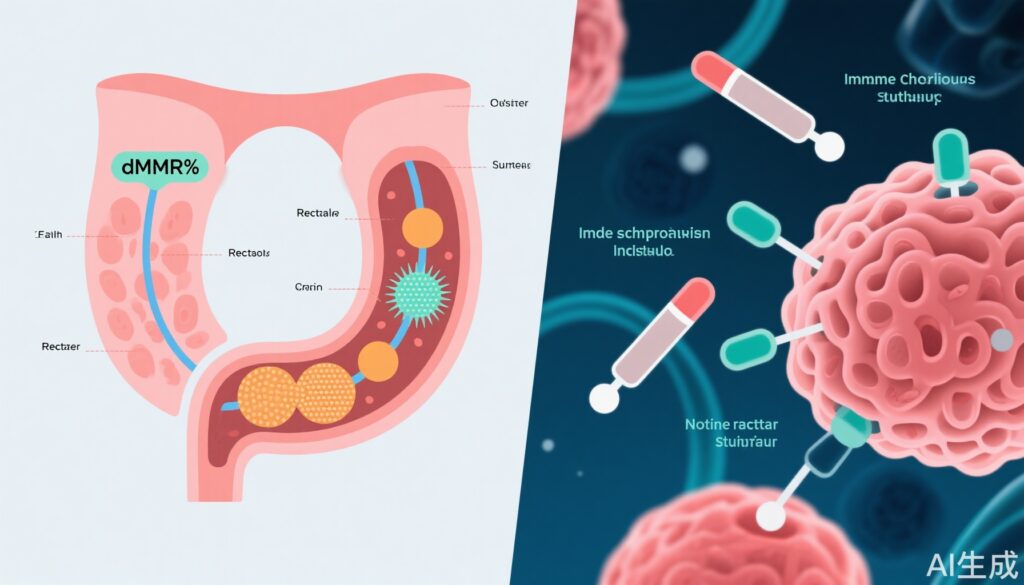Highlights
- Neoadjuvant dostarlimab, a PD-1 inhibitor, achieved clinical complete responses in the majority of early-stage dMMR solid tumors, enabling nonoperative management.
- Two-year recurrence-free survival reached 92%, with most adverse events being reversible and mild, and no compromise in curative resection options.
- This approach demonstrates potential to extend organ-preserving therapy beyond rectal cancer to other dMMR tumor types amenable to surgery.
Clinical Background and Disease Burden
Mismatch repair–deficient (dMMR) tumors are characterized by a high mutational burden and occur across multiple malignancies, including colorectal, endometrial, and gastric cancers. These tumors are associated with Lynch syndrome and sporadic mutations, comprising an important molecular subset with distinct therapeutic implications.
Traditionally, curative management of localized solid tumors relies heavily on surgical resection, which can involve significant morbidity—particularly in rectal cancer, where surgery impacts bowel, urinary, and sexual function, and often requires permanent stoma. The development of immune checkpoint inhibitors (ICIs), particularly PD-1 blockade, has revolutionized treatment for advanced dMMR cancers, but their role in early-stage, potentially resectable disease remains under investigation. The unmet need is for therapies that offer cure while minimizing surgical morbidity and preserving organ function.
Research Methodology
This phase 2, single-arm, multicenter study (NCT04165772) enrolled 117 patients with stage I–III dMMR solid tumors considered amenable to curative-intent surgery. Patients were assigned to one of two cohorts: cohort 1 (locally advanced rectal cancer; n=49) and cohort 2 (nonrectal dMMR solid tumors; n=68). All participants received neoadjuvant dostarlimab (a PD-1 blocking antibody) for 6 months.
Clinical response was assessed by imaging, endoscopy, and biopsy. Patients with a clinical complete response (cCR) could choose nonoperative management, while those with residual disease were scheduled for surgical resection. The primary endpoint was a sustained cCR at 12 months in cohort 1. Secondary endpoints included recurrence-free survival (RFS) and safety across both cohorts.
Key Findings
Among the 117 patients (median follow-up, 20.0 months), 84 of 103 patients who completed treatment across both cohorts achieved a clinical complete response, and 82 proceeded with nonoperative management. In cohort 1 (rectal cancer), all 49 patients achieved cCR and chose to avoid surgery; 37 maintained a cCR at 12 months, meeting the prespecified efficacy threshold. In cohort 2 (nonrectal dMMR tumors), 35 of 54 treated patients achieved cCR and 33 opted for nonoperative management.
Two-year recurrence-free survival was 92% (95% CI, 86–99%), with only a minority experiencing recurrence. Importantly, the ability to perform curative surgery was not compromised in any patient who later required resection. Adverse events were predominantly grade 1 or 2 (60%), and 35% had no adverse events; most were reversible. No unexpected safety signals emerged.
These results suggest that neoadjuvant PD-1 blockade, in early-stage dMMR tumors, can achieve outcomes rivaling surgery while preserving organs in a substantial proportion of patients.
Mechanistic Insights
dMMR tumors accumulate numerous mutations, yielding neoantigens that elicit strong immune responses. PD-1 blockade unleashes cytotoxic T-cell activity, promoting tumor eradication. The high response rates observed across tumor types reinforce the biological plausibility of immune checkpoint inhibition as a foundational strategy in this population.
Expert Commentary
These findings align with growing evidence that dMMR status is a key biomarker for immunotherapy benefit, even in the neoadjuvant setting. As Dr. Luis A. Diaz, Jr. and colleagues have previously highlighted, organ preservation is a critical new frontier for cancer management, particularly given the functional and psychosocial benefits for patients. Guidelines may soon revisit traditional surgical imperatives in light of these results.
Controversies or Limitations
While the study is groundbreaking, several limitations warrant discussion:
- Single-arm design, without a randomized comparator, limits definitive conclusions regarding superiority over standard surgery.
- Follow-up, though promising, remains relatively short for solid tumor recurrence patterns; longer-term durability must be confirmed.
- Patient selection may favor those with more indolent or immunogenic tumors, potentially limiting generalizability.
- Applicability to dMMR tumors with less robust immune infiltration, or to non-epithelial tumors, remains untested.
Conclusion
The phase 2 study by Cercek et al. demonstrates that neoadjuvant dostarlimab enables high rates of organ preservation and long-term recurrence-free survival in patients with early-stage dMMR solid tumors, extending a paradigm originally established in rectal cancer to other tumor types. These results support a shift toward personalized, biomarker-driven, nonoperative strategies in oncology, emphasizing patient quality of life. However, confirmation in randomized trials and longer-term observation are necessary before widespread adoption.
References
Cercek A, Foote MB, Rousseau B, Smith JJ, Shia J, Sinopoli J, Weiss J, Lumish M, Temple L, Patel M, Wilde C, Saltz LB, Argiles G, Stadler Z, Artz O, Maron S, Ku G, Gu P, Janjigian YY, Molena D, Iyer G, Coleman J, Abida W, Cohen S, Soares K, Schattner M, Strong VE, Yaeger R, Paty P, Shcherba M, Sugarman R, Romesser PB, Zervoudakis A, Desai A, Segal NH, El Dika I, Widmar M, Wei I, Pappou E, Fumo G, Aparo S, Gonen M, Gollub M, Jayaprakasam VS, Kim TH, Garcia Aguilar J, Weiser M, Diaz LA Jr. Nonoperative Management of Mismatch Repair-Deficient Tumors. N Engl J Med. 2025 Jun 19;392(23):2297-2308. doi: 10.1056/NEJMoa2404512.



